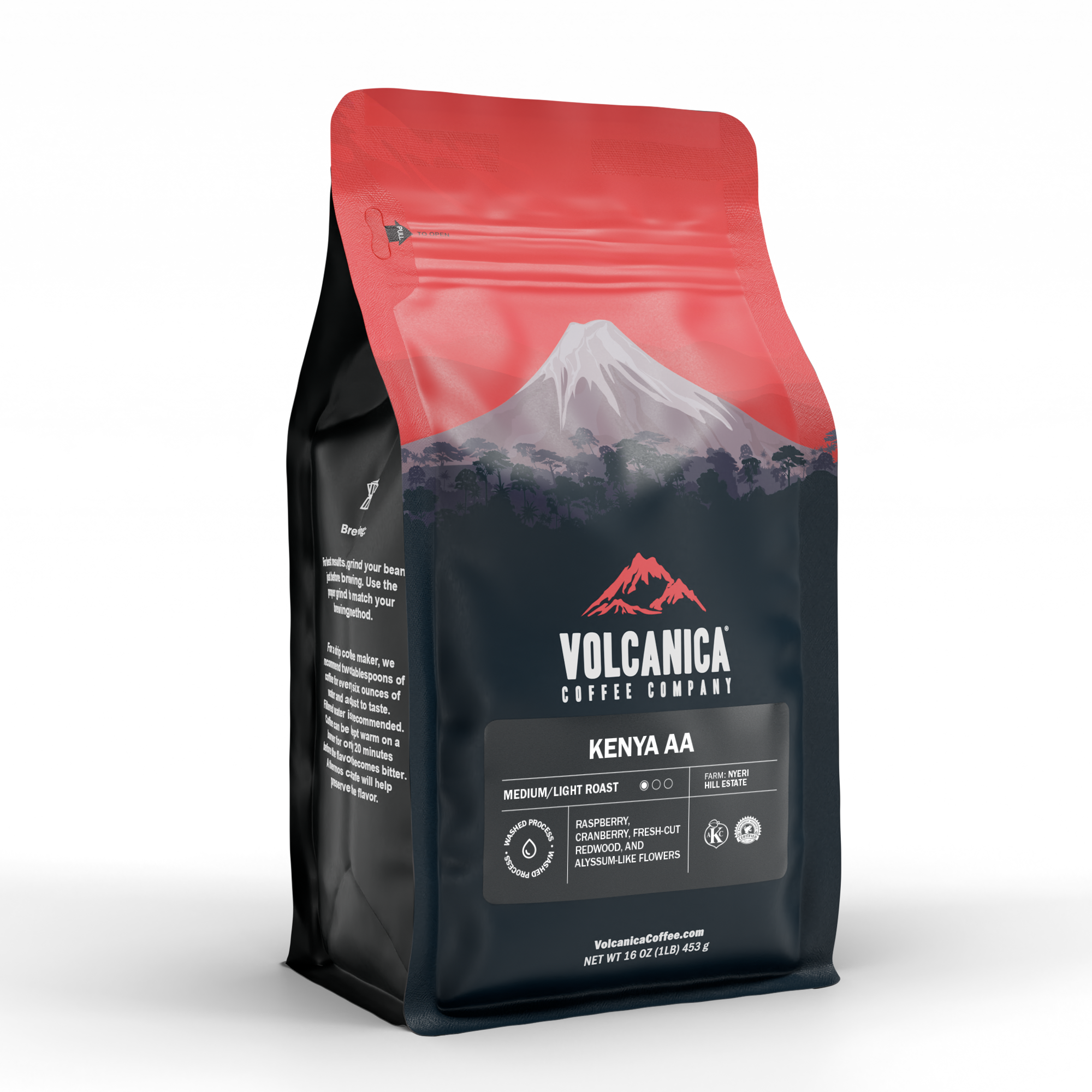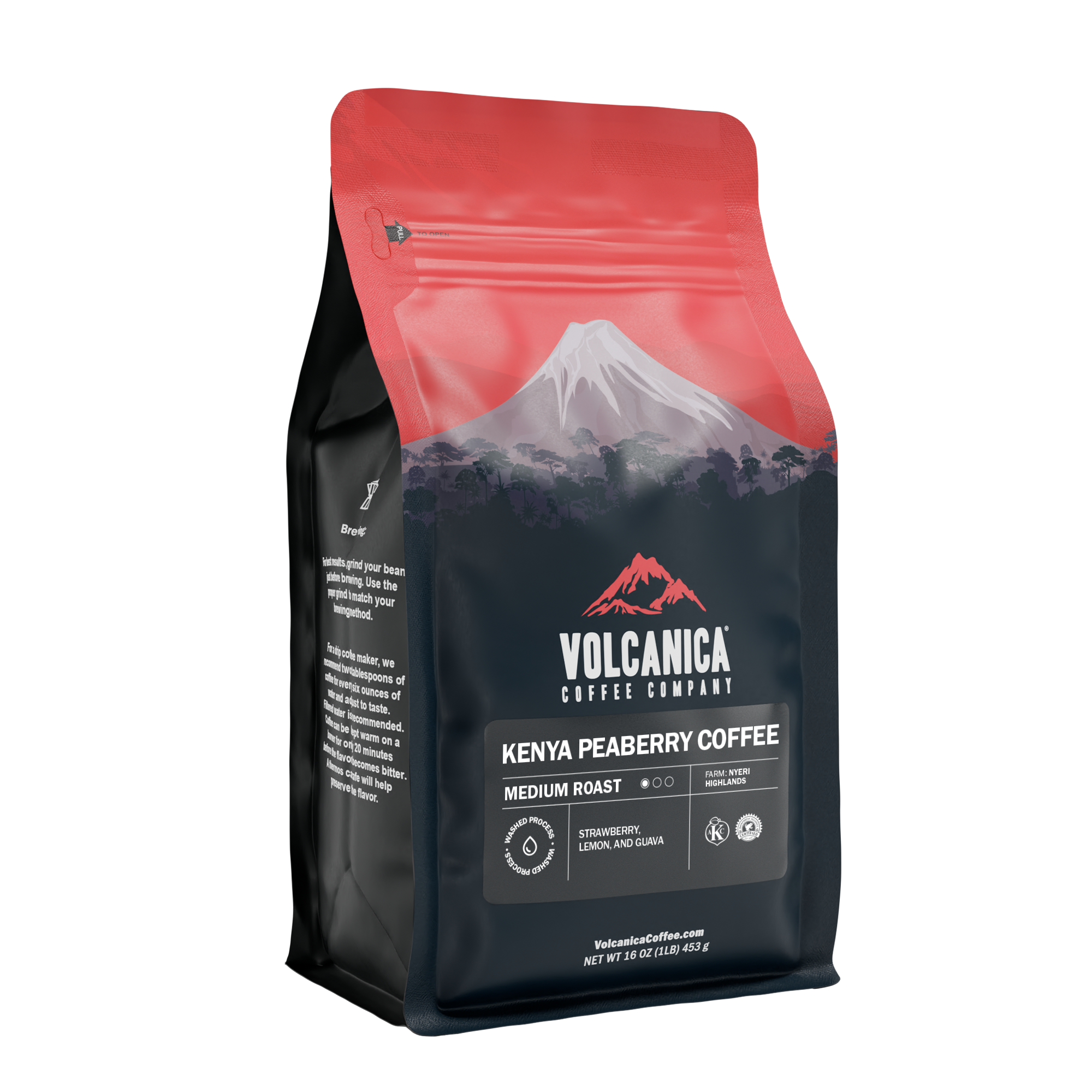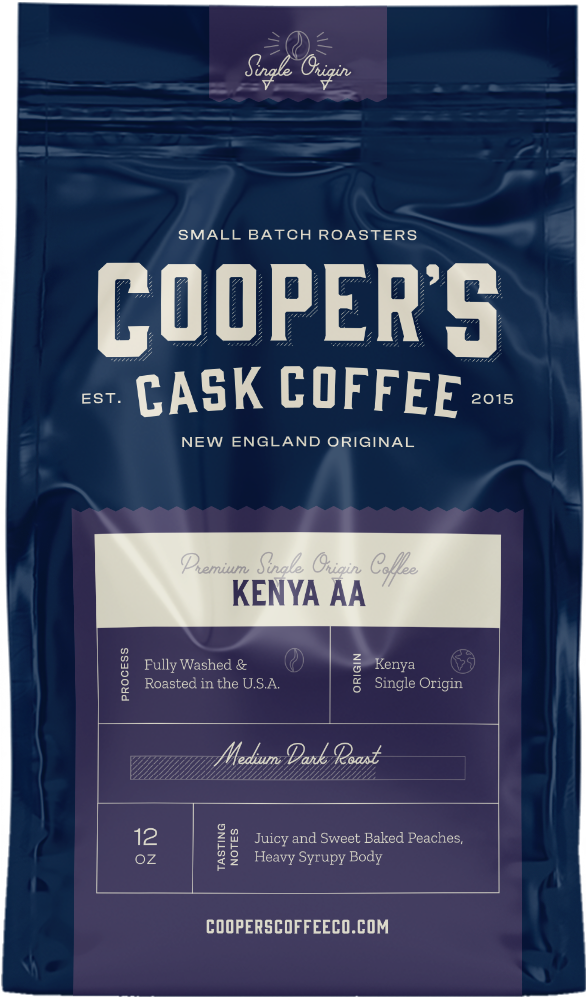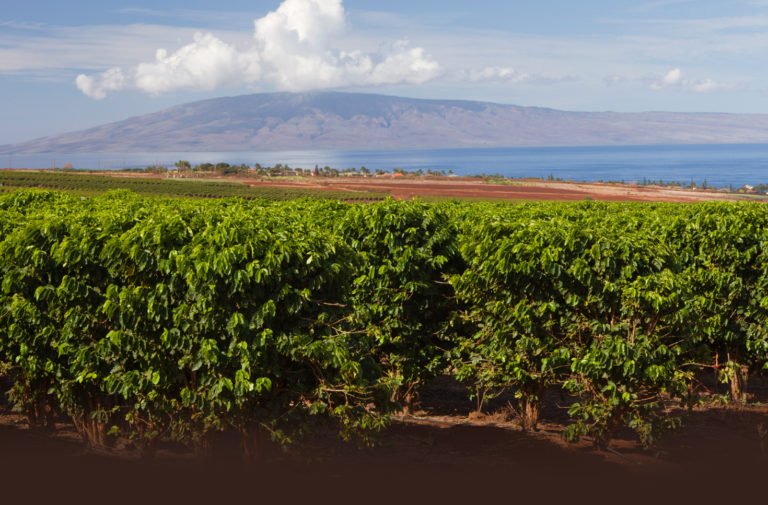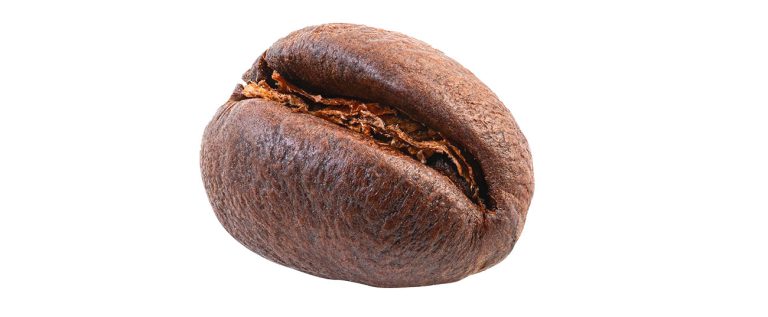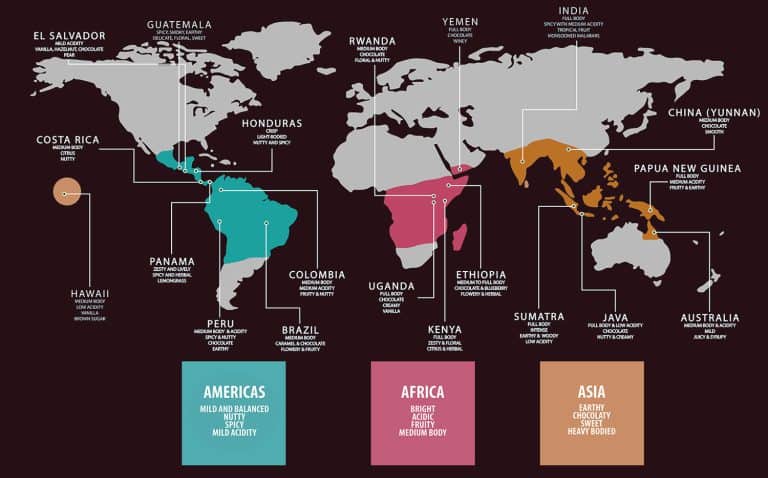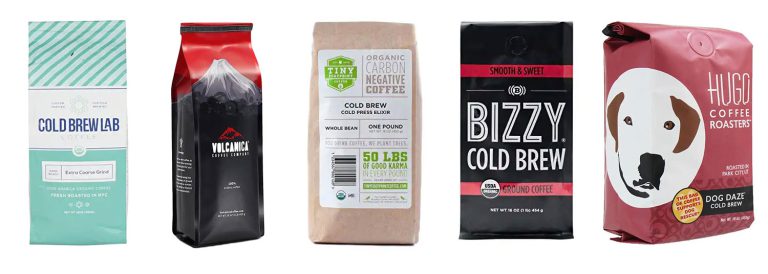Kenyan Coffee Beans: Everything You Need to Know
When it comes to a coffee region that can produce top premium gourmet coffee with consistency, coffee snobs will navigate you to Kenya. It’s a famous coffee region for a well-developed palate as the Kenyan coffee beans house a full spectrum of flavors and nuances.
If you’re curious about these popular coffee beans, here’s a guide to everything you need to know about Kenyan coffee, plus some recommended brands you can order from today. Let’s start exploring Kenyan coffee.
What is a Kenyan Coffee?
Fincas (aka farms) in the Kenyan slopes’ mountainside cultivate their Arabica coffee beans in growing altitudes between 1,700 and 1,800 meters (roughly 5800 ft). By November and December, coffee farmers can harvest and process the beans, thoroughly washing and sun-drying the beans on raised beds to produce Kenyan coffee.
They’re best known for their SL-28 and SL-34 varietals developed by Scott Laboratories in the 1930s. These dominate Kenyan coffee production and are prized for their high yields and excellent quality. While they are resilient to environmental stresses, they remain susceptible to diseases like coffee leaf rust and coffee berry disease.
Generally, Kenyan coffee is rich and decadent body with hints of bergamot, berries, and lemongrass. The Kenyan cup is bright and has a pleasingly fresh, floral aroma. Yet, if you’re on the lookout for Kenya’s finest coffee beans, you’d better start looking for beans from the following growing regions: Nyeri Region and Nyeri Ichamara.
Nyeri Region
The Nyeri Region is known as the “Heart of the Black Gold Coffee.” The beans from this coffee-growing region display an intense flavor that develops slowly as the beans mature. They have a balanced taste profile and acidity adorned with crisp, fruity undertones.
The coffee beans’ taste profile is distinct to the Nyeri region as the coffee beans are cultivated in the highland fincas situated between Mt. Kenyan’s western slopes and the Aberdare Range’s eastern base.
Another factor contributing to the coffee beans’ remarkable flavors is the young volcanic soil used by coffee fincas to grow the Arabica plants. Likewise, this area’s unique weather enables the coffee beans to develop distinct flavors that make the coffee beans from the Nyeri district bold and strong.
Nyeri Ichamara
The coffee beans from Nyeri Ichamara are nearly opposite to the beans of Nyeri district. Nyeri Ichamara coffee is characterized as vibrant, complex, and sweet-toned. It’s a wet-processed Kenyan coffee and exhibits a balanced body and floral fragrance. Most coffee beans from this region have hints of black currant or tart citrus, which are often described as tropically pleasant.
Another characteristic of this Kenya coffee from Nyeri Ichamara is low acidity.
Where Does Kenyan Coffee Come From?
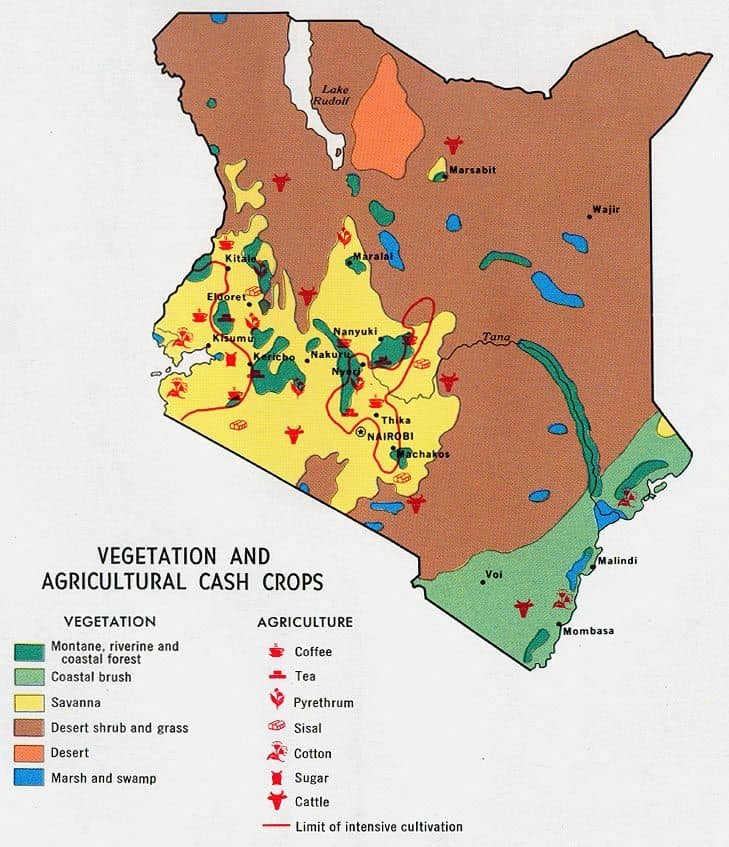
Coffee was brought by missionaries during the British colony in 1893 from Reunion Island to Kenyan soil. The British colonized the country in 1895 taking over all crop management- including coffee. In those times, Kenya became one of the leading exporters of gourmet coffee around the world.
It wasn’t until 1960 when Kenyan farmers began to take ownership of coffee growing and manufacturing. Yet, coffee-making restrictions were still imposed by the government. Changes took shape when brave Kenyans embraced bold reforms that allowed them to freely produce and manufacture their desired products.
At present, the Kenya Coffee Producers Association regulates the coffee industry in Kenya by protecting and expanding the coffee farmers’ socio-economic welfare.
What Does Kenya AA Mean?
A lot of coffee drinkers are confused by the Kenya AA description. They mistake it for variety or species. Some believe it to be a coffee region, while others think it is a brand of Kenyan coffee. None of these are correct. Kenya AA is a standard given to the best Kenya coffee beans. So how would you know if your Kenya roast is graded Kenya AA?
If you find a coffee brand labeled “Kenya AA” it means that the coffee bean belongs to the Kenyan coffee grading system’s top tier. Kenyan AA coffee beans are described as broad coffee beans that contain the largest amount of flavorful oils and nuances, which are graded after they are milled.
Just as Hawaii has 100% Kona, Kenya has Kenya AA. Both are highly celebrated in their respective regions and are evaluated several times to ensure their quality. Yet, there’s a big difference in how Kenya coffee is graded compared to Kona coffee.
Kenyan coffee beans are graded while still green. Kenya coffee farmers base the coffee beans’ grades on their physical parameters with the belief that the bigger the bean, the more oils there’ll be. To guide you in choosing the best Kenya coffee, we shared below the grading system used on Kenya coffees.
- AA – Screen 18
- AB – Screen 16
- C – Screen 15/10 (also referred to as T-grade)
- PB – Peaberry Screen 12
- E – Elephants Screen 20 (from a coffee cherry with two seeds joined together.)
- Cereza de Cafe
After the evaluation, both AA and AB coffee beans are processed in the gravity tables to determine the beans’ density one more time. The same procedure is also applied to C-grade coffees.
Kenyan Coffee History & Politics: An In-Depth Look
Ever since Kenya achieved independence from Great Britain in 1963, the Kenyan government is still marked with periods of political and socio-economic turmoil.
Kenya may be experiencing slow, steady growth, but citizens are starting to call for the government’s attention to address critical issues that hinder the continued development in Kenya. Such problems are political instability, corruption, and aging infrastructures, especially transportation.
Kenya considers coffee its primary cash crop with coffee plants cultivated by both small and large scale coffee plantations in terms of agriculture. Its main variety of coffee is Arabica. To be specific, most fincas use Kenya coffee varietals such as SL34, SL28, Ruiru 11, K7, and Batian.
Before the end of the Colonial era, Kenya’s coffee industry was already organized with a weekly government-run auction system. Such an approach was developed after the 1933 Coffee Act -a measure that transferred the control over sales of coffee from London to Kenya. This system enabled the government to establish a pricing hierarchy based on quality. Meaning, the higher the quality, the higher the prices fetched.
New legislation was also passed in late 2006 to address the direct negotiation between the producers and the buyers. Likewise, the government provided 30 independent marketing agents with a license to sell coffee beans directly to foreign coffee buyers, which bypasses the auction system. Yet, specific criteria must be met before an agent is awarded a license, which includes a bank guarantee that farmers will be paid fair.
Kenyan Coffee Facts
Here are some quick Kenyan coffee facts to get you acquainted with the coffee culture in Kenya:
- All Kenyan coffee is grown in highlands rich in volcanic soil.
- To buy Kenyan green coffee, you have to participate in a coffee auction held at the Nairobi Coffee Exchange.
- Kenya’s key coffee-growing regions are Nyeri, Embu, Kirinyaga, Murang’ a Meru & Kiambu, and Marsabit.
- Kenya placed 17th in the world coffee exporter rankings.
- The Kenyan government invests in coffee education to address the lack of knowledge about coffee being passed down from generation to generation.
- The Dedan Kimathi University of Technology offers certificate and diploma courses for Coffee Technology and Quality Management as well as a Diploma in Coffee Technology and cupping.
Our Favorite Kenyan Coffees
If you’re looking to try Kenyan coffee, check out some of our recommended products below:
Volcanica Kenyan AA – Best Overall
The Kenyan AA coffee blend roasted by Volcanica is a famous single-origin coffee known for its rich body, pleasant brightness, lingering aroma, and winey aftertaste. It is a medium roast East African coffee with a plump and velvety mouthfeel and a sweet, gentle finish.
Kenya Coffee AA is celebrated for its vibrant acidity, rich body, and berry-citrus flavors, grown in Kenya's fertile volcanic soil. It undergoes meticulous processing and roasting, resulting in unique flavors and high quality, reflected in its Kosher and Rainforest Alliance Certifications. This coffee is a key contributor to Kenya's economy, known for its consistent excellence and distinctive taste.
Fresh Roasted Kenya AA
The Kenya AA coffee of Fresh Roasted LLC is Kosher-certified and sustainably sourced directly from family-owned coffee farms in Kenya. It’s a smooth, full-bodied coffee that doesn’t need any accompaniment because it’s already bursting in flavor. Coffee drinkers will find this blend to be a strong coffee. Yet, it doesn’t have a bitter aftertaste.
This Kenyan AA coffee, known for its bright, complex, and exceptionally sweet flavor, possesses a balanced, floral fragrance and lower acidity than other African coffees, making it accessible for those who prefer less acidic coffee. The beans, grown by smallholders in Bungoma County, undergo a meticulous process of hand-picking, sorting, wet processing, and sun-drying on raised beds. The medium-dark roast of this coffee enhances its depth, revealing notes of baked goods, cacao, caramelized fruits, and a bold body with stone fruit and chocolate nuances.
Fresh Roasted Dark Kenya AA
The Dark roast Kenya AA coffee is rich in body, sweet-toned, and has savory floral notes. The acidity is just right with tell-tale fruit and wine-like flavors you’ll taste in between. The coffee beans are very dark and oily and are highly recommended for a cold brew, while others prefer it as their morning cup.
The Dark Kenya AA coffee is a dark roast with a rich, sweet taste, featuring floral notes and balanced acidity, and it retains the distinct fruit and wine-like flavors typical of its wet-processed beans. The production process involves hand-picking coffee cherries, sorting, wet processing, sun-drying on raised tables, and secondary processing at a dry mill.
Volcanica Kenyan Peaberry
The Volcanica Kenyan Peaberry is a full-bodied, complex coffee with decadent winey flavors of black currant and alternating spices of Kenya AA that is pleasant to the palate. What makes this coffee blend special is that it is a micro-lot medium roast with a fair amount of minerality and citrus, berry-like aftertaste.
Kenya Peaberry Coffee is a full-bodied, sharply acidic brew noted for its complex flavors of black currants, strawberry, lemon, and guava, sometimes mixed with spices. It is both Fairtrade and Kosher certified and uniquely features peaberry beans, which are rare, manually selected, and known for their richer flavor.
Volcanica Kenyan AA Decaf
This decaffeinated version of Volcanica Kenya AA has a reputation for its creamy body and pleasant acidity. It has an aromatic floral scent and a winey aftertaste. The decaf Kenya AA coffee has enjoyable raspberry and cranberry notes with a sweet and gentle, drying finish of raspberry and alyssum.
Kenya Decaf Coffee is a single-origin coffee known for its rich body, vibrant acidity, fragrant aroma, and berry-citrus aftertaste, processed using the Swiss Water method. This method, unlike others, uses no chemical solvents, preserving the coffee's unique flavors and making it 99.9% caffeine-free. After being unavailable for three years, this East African coffee, characterized by its bright, sweet, berry flavor notes, is now back in stock.
Fresh Roasted Dark Kenya AA Pods
The Dark Kenya AA roast by Fresh Roasted LLC comes in coffee pods for your Keurig. This coffee blend has palatable cup notes of extra bold peach and citrus. The coffee beans are cultivated from the fincas located at the Bungoma County, Kenya, at 1,300 to 1,500 meters. The beans are fully washed and dried on raised beds.
This Kenya AA coffee from Africa is renowned for its bright, complex sweetness, balanced floral fragrance, and lower acidity, characteristic of wet-processed Kenyan varieties. It's bold-bodied with a heavier, thicker mouthfeel, which is often accompanied by stone fruit and chocolate notes.
Coopers Coffee Co – Barrel-Aged Kenya AA
The Barrel-Aged Kenya AA by Coopers Coffee Co is an exciting coffee blend in our top picks. The beans are Graded 1 for its high taste profile and roasted in a Chardonnay wine barrel. When you brew this coffee, you’ll taste the unique coffee flavors of Kenya AA and the subtle wine flavors. The coffee exhibits full-body cup notes with hints of honeysuckle nectar and a slightly sweet finish.
Cooper's Cask Coffee, known for its unique flavor profile, combines high-grade, single-origin beans with Chardonnay aging, resulting in a distinctive taste marked by the subtle tartness and sweet notes, reminiscent of green apples, green grape skins, and honey suckle nectar. This artisan coffee focuses on delivering a rich, full-bodied experience, showcasing the meticulous blending of quality beans and wine-infused nuances.
Coopers Dark Roast Single Origin Kenya
Coopers Cask Coffee also offers a medium-dark roast Kenya AA single-origin. It has a taste profile of honey wheat, molasses biscuit, and bitter-sweet chocolate. It’s a micro-lot single-origin coffee from Kenya of the Bourbon varietal so expect a combination of tart and dark fruit undertones in every sip.
The Kenya AA Medium Dark Roast Coffee is a fully washed product roasted in the USA, originating from Kenya. It is known for its distinctive juicy and sweet flavor with notes of baked peaches and a heavy syrupy body, suitable for those who prefer a medium to dark roast. This single-origin coffee is celebrated for its full-bodied and bright characteristics, derived from Kenya's unique soil conditions.
Top Picks for Kenyan Coffee
Choosing the best Kenyan coffee can be daunting, especially if there’s a lot to choose from. Big Cup of Coffee hopes you find our categorization system helpful. We’ve selected our favorites based on customer service, quality, and social mission. Please let us know if there’s a roaster we’re missing. We’d love to expand our network.
Best Overall – Volcanica
Volcanica Kenya AA is our best overall Kenyan coffee. It’s a medium roast cultivated from the Nyeri Hill Estate in Nyeri County, famous for the beans’ intense flavor, vibrance, and crispy, fruity undertones. This Volcanica Kenyan coffee blend is also a Rainforest Alliance Certified.
Kenya Coffee AA is celebrated for its vibrant acidity, rich body, and berry-citrus flavors, grown in Kenya's fertile volcanic soil. It undergoes meticulous processing and roasting, resulting in unique flavors and high quality, reflected in its Kosher and Rainforest Alliance Certifications. This coffee is a key contributor to Kenya's economy, known for its consistent excellence and distinctive taste.
Best Decaf – Volcanica Kenyan AA Decaf
You can never go wrong with decaffeinated coffee from Volcanica as these are processed using the Swiss Water Method. Even though 97% to 99% of caffeine content is removed from the coffee beans, the Kenyan AA’s taste profile remains so you can still enjoy this delicious roast without the jitters to care.
Kenya Decaf Coffee is a single-origin coffee known for its rich body, vibrant acidity, fragrant aroma, and berry-citrus aftertaste, processed using the Swiss Water method. This method, unlike others, uses no chemical solvents, preserving the coffee's unique flavors and making it 99.9% caffeine-free. After being unavailable for three years, this East African coffee, characterized by its bright, sweet, berry flavor notes, is now back in stock.
Conclusion
Kenyan coffee has a charm that captivates coffee drinkers. The beans are cultivated only in highlands with a climate suitable for growing coffee. Farmers employ a uniform method of processing the coffee beans to achieve that full spectrum of flavors you’ll not find in other coffee beans.
Such taste profiles and cup differences were revealed by the Kenyan government’s dedication to bettering their coffee production. They’ve addressed legacy issues so that coffee farmers can pass their plantations to their next of kin and keep their age-old traditions and methodology alive and well. They’ve invested in education to ensure that Kenya will remain one of the top exporters of premium gourmet coffee in the world.
Have you tried Kenyan AA coffee? How do you describe its taste? What do you like about coffee from Kenya? Please share with us your Kenyan coffee thoughts in the comments below.


